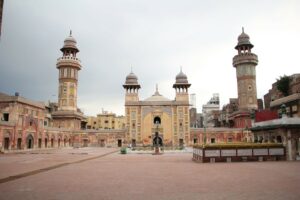GILGIT: The Khunjerab Pass, a vital gateway for the China-Pakistan Economic Corridor (CPEC), has officially been inaugurated for year-round trade and travel between Pakistan and China.
This major development, announced on Tuesday, is being hailed as a historic milestone that will further deepen regional cooperation and foster economic growth in both nations.
Previously, the Khunjerab Pass, which serves as the entry point for the CPEC route, was only accessible from April 1 to November 30 due to heavy snowfalls during winter.
However, under a new agreement between the governments of Pakistan and China, the border will now remain open throughout the entire year, facilitating continuous trade and travel.
A high-level virtual ceremony marked the occasion, with key officials from both China’s Xinjiang province and Pakistan’s Gilgit-Baltistan government in attendance.
From the Chinese side, the Governor of Xinjiang province also participated.
A New Era for Gilgit-Baltistan and Pakistan
“This is a historic moment not just for Gilgit-Baltistan, but for the entire nation of Pakistan,” said Chief Minister Haji Gulbar Khan.
“The opening of Khunjerab Pass year-round will inject new life into Gilgit-Baltistan’s economy, enabling uninterrupted business exchanges between Pakistan and China throughout the year.”
The chief minister emphasized that this move is a key achievement in transforming the vision of CPEC into reality.
“This decision signifies a practical and important step towards strengthening the partnership between Pakistan and China,” he added, highlighting the significance of this milestone.
Officials from both regions echoed the sentiment, describing the decision as a major advancement in regional cooperation and a transformative step in the ongoing CPEC project.
The year-round access will enhance trade relations, bringing mutual benefits to the people of both Pakistan and China.
A Symbol of Prosperity and Cooperation
In his remarks, the Governor of Xinjiang underlined the importance of the long-standing friendship between Pakistan and China.
“The opening of the Khunjerab Pass year-round marks the beginning of a new chapter in our relations. It will directly benefit the citizens of both regions, strengthening ties of peace and prosperity,” he stated.
Khunjerab Pass, situated at a remarkable 15,500 feet above sea level, is the highest paved international border in the world.
Its year-round opening will significantly improve accessibility and facilitate the continuous flow of goods, services, and people across the border.
During the ceremony, Chinese officials showcased a documentary detailing the customs clearance system in Xinjiang.
Both sides were briefed on the operational procedures for managing customs activities, with the Commissioner of Kashgar city and the GB Customs Collector providing insights into the customs operations at both ends of the border.
A New Phase in Economic Cooperation
This development stems from an agreement signed between Pakistan and China in December, amending the 1985 agreement on the management of the Khunjerab Pass.
Under the new terms, trade and travel across the pass will be possible throughout the year, as per Article 2(3) of the 2013 border management agreement.
The year-round operations officially began in December last year, further solidifying the growing cooperation between the two nations.
The Khunjerab Pass is strategically significant, not only as a key entry point for CPEC but also as a symbol of the continued partnership between Pakistan and China.
The move to keep it open year-round is expected to stimulate economic activity, encourage trade, and pave the way for new opportunities for the people of Gilgit-Baltistan and Xinjiang.
With the border now open throughout the year, the hope is that the enhanced connectivity will bring a host of benefits, ranging from increased trade to better cultural exchanges, which will further strengthen the bilateral ties between the two nations.
Among those joining the ceremony via video link were Gilgit-Baltistan Chief Minister Haji Gulbar Khan, ministers Engineer Muhammad Anwar and Rehmat Khaliq, Customs Collector Ghulam Mustafa, and Additional Chief Secretary Mushtaq Ahmed.









